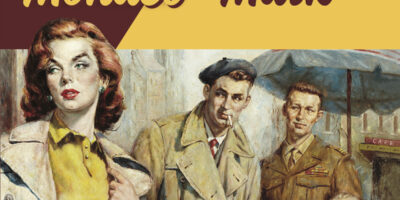There is something oddly endearing about the expressive, heartfelt writings of the late Danish writer Knud Sønderby, whose talents as an essayist are ideally represented in Fragments of a Mirror: Selected Essays. Largely centered around the author’s extensive travels through his home country, the style and tone of the writing varies from observational and reflective to experimental and offbeat, which is not so surprising given that these essays span twenty-eight years, from 1941 to 1969. Despite the range of voice and subject, Sønderby is always candid and perceptive, willing to cast light on small, unseen things and highlight aspects of them he finds fascinating. This is really the heart and soul of Sønderby’s writing—his remarkable awareness in noticing ordinary, everyday people and yet discerning something singular about them. He has the ability to give significance to almost anything. In a churchyard, for example, he observes a priest conversing with a mournful father who is “sitting with bowed head, turning his cap in his hands.” The man’s eighteen-year-old son has died and the priest is questioning the father’s atypical choice of inscription. After listening to the priest’s objections, the father clears his throat and responds:
Yes, of course, he understands that the pastor is right. It was just that, as the pastor well knows, the boy was pretty much the only thing we had . . . Yes, and then this occurs . . . But then in the end that came to be written on the stone, and he didn’t have money for another stone, so it would have to remain like after all…
So there it is on the gravestone. WHY. The most dangerous word in the world.
For me, the most gratifying segments are the humorous ones—the passages where Sønderby allows us to see the comicality in a situation, even when the situation seems almost pitifully awkward. His unwavering observations of bickering strangers on a train, full of acrimony and bile, become wonderfully entertaining:
Standing in the aisle, the traveling businessman stares at her with a faraway look in his eyes. Suddenly his attention piques, due to a terrible suspicion. He raised to his full height, with a smoldering look in his eyes and murder in his voice.
“Tell me. Are you sitting on my hat?”
An otherwise long and tedious journey becomes an acutely funny, wild, and stimulating analysis of his friend, the impatient motorist, who is frustrated by speed signs and rest stops—in fact, anything that comes between foot and gas pedal. On a family drive, with the kids yelling for ice cream or hot dogs, he speeds past every eatery the kids spot, muttering contrite excuses and apologies, his focus purely on the road ahead.
And landscapes and hot dog carts and ice cream stands whiz by, and when he finally gives in to the combined family pressure of cries and protest, he says, “Okay, take it easy,” as if irritated and slightly amazed at the commotion, as if he’d never had the least bit against stopping and taking a break whenever and wherever – “For God’s sake, can’t you see, I pulled over!”
Full of deft humor and thoughtful introspection, Fragments of a Mirror offers up glittering shards of Knud Sønderby at his finest. Though only fifty-seven years old when he died, Sønderby published five novels, six collections of essays, and multiple plays. During his lifetime, he became a distinguished Danish novelist, journalist, translator, and essayist. Longtime translator Michael Goldman should be congratulated for bringing this fine Danish writer’s work back into circulation, fifty-one years after the author’s death, and introducing him to a new population.
(Spuyten Duyvil, paperback, $15)
On February 27, 2017, the Colorado Review published my review of Knud Sønderby’s story collection Fragments of a Mirror: Selected Essays, translated by Michael Goldman. I had the honor of publishing a very fine essay by Sønderby in the Lowestoft Chronicle some time ago. This excellent collection, which I’m proud to have provided a back cover blurb for, includes that essay. You can read my full, in-depth book review here.



